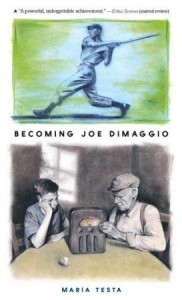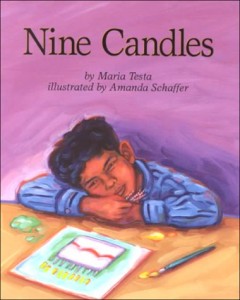As a college student in 1958, John Lewis read a comic-book account of the Montgomery Bus Boycott and the activism of Dr. Martin Luther King, Jr. By that point, Lewis had come to question the Jim Crow measures that limited…
Category: Economic Justice/Poverty/Immigration
Human Rights & Children’s Books: USBBY & PEN
United States Board on Books for Young People, USBBY, and International Board on Books for Young People, IBBY, provide an excellent source of information, reviews, and lists of outstanding international books – an international celebration of diversity. Each year…
Maria Testa Gives Voice to Children of Imprisoned Parents
When I heard about Maria Testa’s book, Nine Candles, I needed it immediately. I was organizing book discussion programs for inmates reading children’s literature at the State Prison for Men in Concord, New Hampshir e. Through the New Hampshire Humanities Council, we offered the program to men participating in the prison’s Family Connections Center to build skills as fathers. Nine Candles tells a story of a young boy who visits his mom in prison. The book was out of print, but in my search, I met the author.
e. Through the New Hampshire Humanities Council, we offered the program to men participating in the prison’s Family Connections Center to build skills as fathers. Nine Candles tells a story of a young boy who visits his mom in prison. The book was out of print, but in my search, I met the author.
In this first post I am privileged to write for The Pirate Tree, I want to write about Maria Testa and two of her books that, in poignant scenes sparingly told, bring readers into the experience of a child with a parent in prison. The books are pertinent today at a time that the U.S. Attorney General Eric Holder is lending his power to the fight for prison reform.
“It is important that the children of imprisoned parents do no feel alone,” Testa wrote in 1996 in her author’s note to Nine Candles, “and that they  see their parents as often as possible.” Since 1996, the number of people incarcerated has steadily increased due to mandatory minimum sentencing. Today 2.7 million American children have an incarcerated parent, most for nonviolent crimes. 1 in 28 children have a parent in prison. Twenty-five years ago, the rate was 1 in 125. (The Pew Charitable Trusts.)
see their parents as often as possible.” Since 1996, the number of people incarcerated has steadily increased due to mandatory minimum sentencing. Today 2.7 million American children have an incarcerated parent, most for nonviolent crimes. 1 in 28 children have a parent in prison. Twenty-five years ago, the rate was 1 in 125. (The Pew Charitable Trusts.)
As a student at Yale Law School, Testa was director of the Jerome N. Frank Legal Services Organization, a prisoners’ rights organization through which she worked with inmates on legal issues after they were sentenced. “It defined my law school career,” she says. “So many inmates were young, early 20s. They all had young kids.” The children often visited during regular hours when she was there, and she describes the visits as heartbreaking to observe. She also saw “uplifting moments of real joy.”
Testa’s books are significant in their power to show the impact on children of incarceration at a time when U.S. Attorney General Eric Holder has called for reforms in mandatory minimum sentencing and to “allow judges more discretion to determine sentences for low level drug offenses.” Testa asks a fundamental question about our legal system that arises from sentencing mandates: “What does it take to be a judge? If there are strict guidelines, what is the role of the judge?”
As a law student she wrote fiction about families affected by incarceration, short stories. Later, she wrote Nine Candles. In 2002, she wrote the slight and beautiful novel in verse Becoming Joe DiMaggio.
In Becoming Joe DiMaggio, Joseph Paul grows up with passion for DiMaggio and the Yankees whose games he follows with his Papa-Angelo, his grandfather. You hear the backstory through Joseph’s eyes and heart, that his father, who he loves, is in prison. And you understand how the magic of a family’s passion for an Italian-American baseball star can sustain and shape a boy as he grows up missing his father. Testa brings the writing of these stories very close. She tells me, “My father’s father – for 16 of his first 21 years, was in prison.” In Becoming Joe DiMaggio, she is composing her father’s life.
“There’s a pretty good hope,” Testa says, that Nine Candles is being re-released. Becoming Joe DiMaggio is available from Candlewick. Both books give voice to children of imprisoned parents. Testa gives Joseph Paul these closing words:
Look how we have made
our broken hearts soar.
AFRICA IS MY HOME
AFRICA IS MY HOME, A CHILD OF THE AMISTAD By Monica Edinger and illustrated by Robert Byrd Monica Edinger skillfully – and delightfully – tells an extraordinary story through the voice of a young girl who experiences an extraordinary journey. …
Exploring the Range of New Adult: A Review of Sideshow of Merit
Ann Angel’s interview with Lauren Myracle about The Infinite Moment of Us touched on the emergence of New Adult—a publishing category designed to appeal to readers in their upper teens and early twenties. Various other discussion groups have focused on…
Living on the Edge–an interview with Alex London
A couple weeks ago, I went on a scary, spectacular ride. The ride was a book, Proxy by Alex London. Imagine a world where life is so expensive for most people that they must go into enormous debt just to…
Human Trafficking, Immigration, and Sexual Violence: an interview with Cori McCarthy
Lyn Miller-Lachmann already reviewed The Color of Rain by Cori McCarthy, which you can read here. I conducted a follow-up interview with Cory via email. Thanks for joining us again! JLP: Where in the world did you get an idea…
LOOKS LIKE DAYLIGHT
LOOKS LIKE DAYLIGHT by Deborah Ellis, Foreword by Loriene Roy Sit down. Open this book, LOOKS LIKE DAYLIGHT. You will be surprised. Deborah Ellis traveled across the North American continent – the U.S. and Canada – to interview Native…
DARE TO DREAM …CHANGE THE WORLD
DARE TO DREAM…CHANGE THE WORLD Edited by Jill Corcoran, illustrated by J. Beth Jepson What a beautiful collection of poems that inspires and challenge. We all have prejudices and we all have felt discrimination. Who has not been bullied, left…
Razia’s Ray of Hope: One Girl’s Dream of an Education
Razia’s Ray of Hope: One Girl’s Dream of an Education by Elizabeth Suneby is extremely informative, providing children just enough of a glimpse into the strange educational apartheid in Afghanistan. The Zabuli Education Center for Girls in Kabul is a…